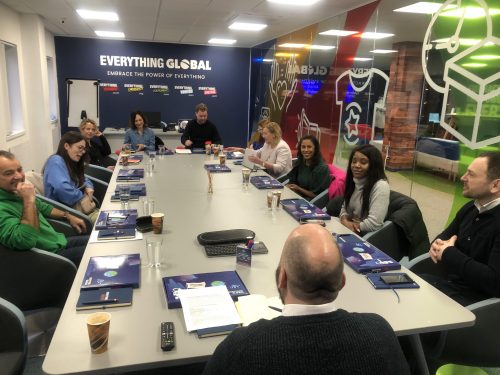Round table report: Professional services – building the brand

What do professional services firms stand to gain by investing in marketing and PR? Is getting the right blend of marketing as important as the overall message? Our “Building the Brand” round table hosted by Everything Global saw a panel of industry experts drill down to the heart of the matter.
“We’ve explored every marketing avenue, and what we’ve learned is that consistency is key”, says Everything Global’s resident digital expert Rob Mobsby.
“When you break these things down, it all comes down to what’s key for your business. What values are you trying to convey?”
Steve Noss, head of creative at Cooper Parry, agrees.
“If the messaging isn’t right”, he says, “the mix you choose is less important. It’s about getting a good balance of both.”
While firms should be wary of good messages “getting lost in the social media ether”, as Everything Global’s James Kyte puts it, framing them in a way that appeals to the specific clients you’re looking to target is more likely to reap positive results.
Emma Houghton, external communications and corporate affairs business partner at Shakespeare Martineau, agrees.
“Everything comes back to the client”, she says.
Thinking carefully about which platforms your clients value the most is crucial, adds Anna Smith, partner and director of marketing and business development at Nelsons.
“Because marketing is ultimately about reaching the people you want to reach.”
The UK economy has just narrowly avoided recession. Should professional services firms still be investing in marketing?
Smith: “It’s obviously important for profile reasons, but there is also value in marketing from a recruitment perspective.”
Stephanie Dennis, marketing specialist at Finch Consulting, is on the same page.
“Yes, firms definitely still want to be doing it”, she says.
“Every business is going to challenge how they spend their marketing budget now”, says Noss.
“There can be no assumption that every spend will continue. It’s actually a brilliant time to experiment.”
Jo Chileshe, media relations senior manager at KMPG, says marketers have to demonstrate “now more than ever” how they’re delivering ROI “and take people on the journey.”
In the corporate finance sector, says Provantage’s Natalie Elder, “it’s difficult to determine who you’re marketing to, because we tend to win a client, do the work and move on. Because of that it can be difficult to get your name out there. Our approach has been to focus on walking the walk.”
Are marketing messages changing? For example, what impact is the rise of the ESG message having?
Hilary Campton, founder and director of V Formation, feels “it depends on the client, and what it is they’re specifically looking to achieve.”
“You certainly don’t want to look like you’re greenwashing”, adds Dennis.
Mobsby adds that the question is “complex, because evidence suggests physical marketing objects aren’t just going to go away.”
Chileshe: “This is where data comes in. At KPMG, we are holding ourselves to account by being transparent. Firms need to get the balance right between the E, the S and the G.”
“Don’t just be seen to be doing something for the PR”, adds Elder.
What to say to professional services firms who are still cynical about marketing and PR?
“Demonstrate the engagement they will get from it. Prove the value it will add”, says Talia Masters, marketing and communications manager at Claritas Tax.
Campton: “I don’t see as much cynicism anymore!”
Noss: “Tell them to get real! Don’t waste your energy trying to change a cynic, it’s their loss.”
What are the relative virtues of employing an in-house PR vs. working with an external agency? Again, there’s no one-size fits all solution – it depends what’s right for your business.
Mobsby: “You’ll struggle to be consistent if you keep flipping between the two. We’re moving more in the in-house direction, mainly because we can control it more.”
Smith: “At Nelsons, we’ve found our external PR agency to be like an extension of the team.”
So, what’s next? What will the future of marketing look like in the professional services sector? Should firms get onboard with the Tik-Tok revolution, etc?
Stephanie Dennis questions whether firms are being “blind” by not joining Tik-Tok.
Houghton: “I suppose it depends on who you want to talk to. Are we trying to reach 20-year olds?”
Hilary Campton argues firms have “got to agree on the business case” before employing these kinds of tactics.
Mobsby: “At Everything Global, we’re increasingly doing more on YouTube, because at the end of the day it’s a huge search engine. Perhaps companies will move away from LinkedIn? It’s changing. The messages being put out on LinkedIn are becoming more personal.”
The spectre of artificial intelligence is raised… but that, to coin a phrase, is a question for another day.
Panel:
Jo Chileshe, KPMG
Hilary Campton, V Formation
Stephanie Dennis, Finch Consulting
Natalie Elder, Provantage Corporate Finance
Ian Evans, TheBusinessDesk.com
Jack Hickey, TheBusinessDesk.com
Emma Houghton, Shakespeare Martineau
James Kyte, Everything Global
Talia Masters, Claritas Tax
Rob Mobsby, Everything Global
Steve Noss, Cooper Parry
Anna Smith, Nelsons









